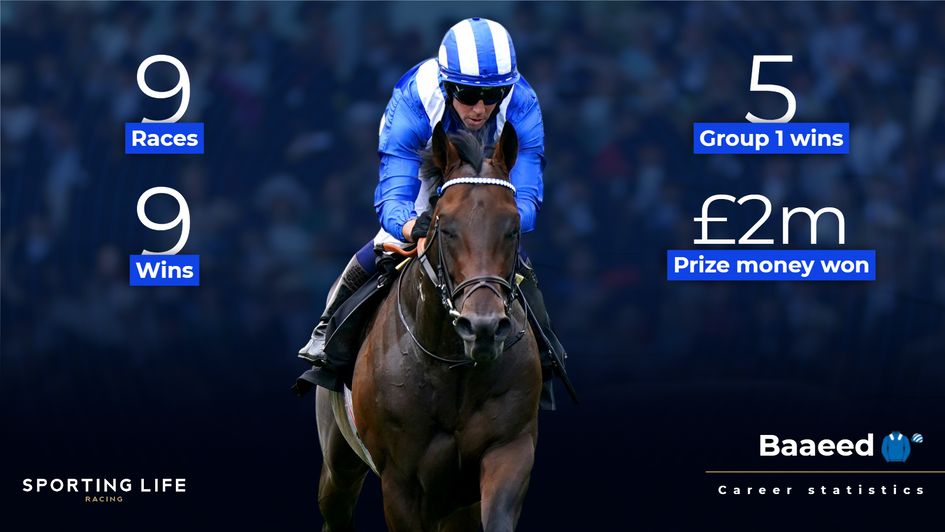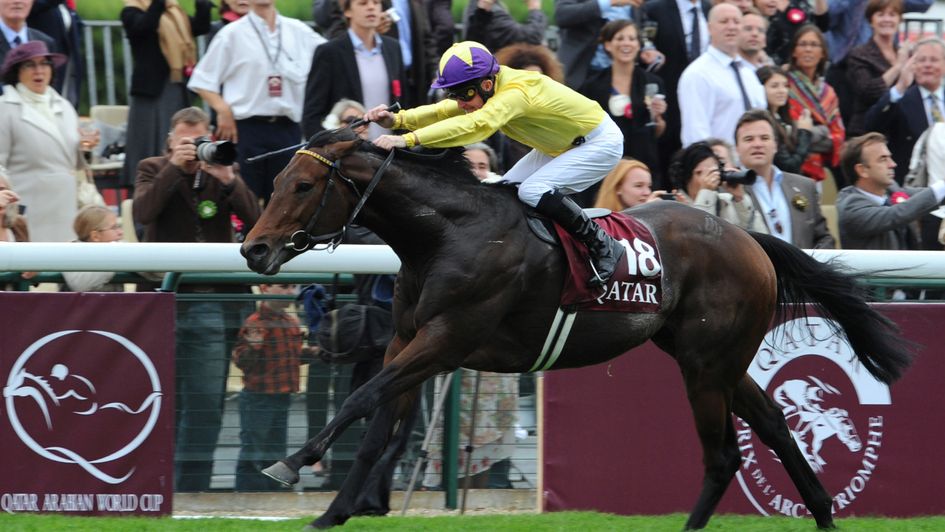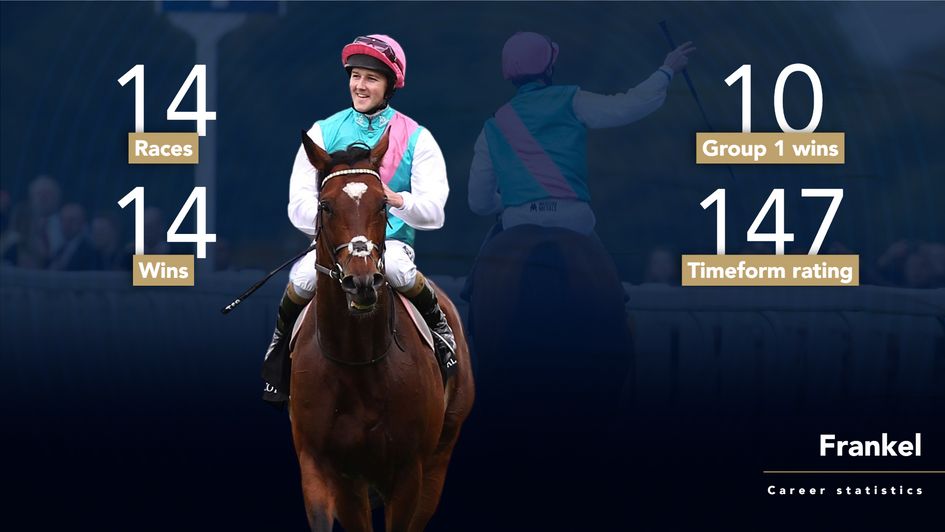Adam Houghton underlines how comparisons between Baaeed and Frankel – the greatest racehorse in Timeform's history – are premature.
With a Timeform rating of 134, Baaeed certainly belongs in the conversation when it comes to the best horses trained in Britain or Ireland since the days of Frankel.
For context, only two horses have achieved a higher rating in the last decade, namely Battaash, Timeform’s champion sprinter in 2017, 2018, 2019 and 2020, and Cracksman, a son of Frankel who won the Champion Stakes by wide margins in both 2017 and 2018. Both horses had a peak annual rating of 136.
It’s not just those past champions with whom Baaeed has drawn comparisons this year, however.
No, some have dared to go one step further by mentioning Baaeed in the same breath as Frankel himself, a debate which seemed to gain more traction on social media last week after Baaeed had made it nine from nine with victory in the Sussex Stakes at Goodwood.

That was another impressive performance no doubt and one which underlined Baaeed’s status as the dominant miler of his generation. But as good as Frankel, the greatest racehorse in Timeform’s history with a rating of 147?
Here we’ll explain why Baaeed is still some way behind Frankel on Timeform ratings, with two key questions to bear in mind.
Firstly, what did Frankel do to earn his Timeform rating of 147? And secondly, what hasn’t Baaeed done yet to leave him on a Timeform rating of ‘just’ 134?
Exhibit A: Quality of opposition
Perhaps the best illustration of Frankel’s brilliance as a racehorse was how many top-level performers simply couldn’t lay a glove on him when it was their turn to step into the ring.
In total, Frankel came up against no fewer than 24 individual Group/Grade One winners in his 14-race career and, whilst some put up more of a fight than others, they all ultimately met with the same fate.
Fittingly, Frankel faced arguably his toughest test on his final start when winning the 2012 Champion Stakes, always doing just enough on softer going than ideal to land the spoils by a length and three-quarters.
It was another outstanding performance and a brilliant race when you consider that the pair who completed the frame were both multiple Group One winners, namely the mud-loving French raider Cirrus des Aigles, who had won the race in 2011, and old rival Nathaniel, who had passed the post just half a length behind Frankel on their respective debuts at Newmarket in August 2010.

If Cirrus des Aigles was the highest-rated horse Frankel came up against during his illustrious career, then Excelebration can probably be called the most persistent.
Indeed, it’s fair to say that no horse suffered at the hands of Frankel more than Excelebration, who was totally outclassed in all five of their meetings, never getting closer than the two and a quarter lengths he was beaten in the 2011 St James’s Palace Stakes.
Excelebration was still a three-time Group One winner in his own right, though, and the performance he produced when winning the 2012 Queen Elizabeth II Stakes features among the best from any miler this century – Frankel aside, of course.
Canford Cliffs, Dream Ahead and Farhh were other horses who endured bruising encounters with Frankel but looked like bona fide superstars when winning Group One races in which he didn’t feature among the opposition.
In most normal years they would have been considered superstars – there just wasn’t anything normal about the three years in which Frankel was strutting his stuff on Britain’s turf.
Cirrus des Aigles, Excelebration and co all played an important role in the Frankel story, though, and it’s just a shame that Baaeed has had so few horses of that calibre to challenge him in the miling division since he gained his first Group One win in last year’s Prix du Moulin de Longchamp.
Baaeed has so far beaten only 13 individual Group/Grade One winners in his career and has come up against just one horse with a Timeform rating above 125. The horse in question was the five-time Group One winner Palace Pier, who ended last season with a rating of 129 after pushing Baaeed all the way to the line in a thrilling edition of the Queen Elizabeth II Stakes.

Unlimited Replays
of all UK and Irish races with our Race Replays
Discover Sporting Life Plus Benefits

In his other Group One wins, Baaeed was chased home by the 120-rated Order of Australia in the Prix du Moulin, the 125-rated Real World in both the Lockinge Stakes and the Queen Anne Stakes, and the 122-rated Modern Games in the Sussex Stakes.
Instead, it might be when Baaeed steps up to a mile and a quarter in next month’s Juddmonte International at York that he finally comes up against a rival capable of pushing him to even greater heights.
With a Timeform rating of 129, Mishriff looks a prime candidate when he attempts to defend his crown on the Knavesmire. A six-length winner last year, he proved at least as good as ever when suffering a narrow defeat in the Coral-Eclipse on his penultimate start last month.
Exhibit B: Winning margins in Group One races
It’s rare for a horse to win a Group One by six lengths like Mishriff did in last year’s Juddmonte International, but it became a regular sight during Frankel’s glittering career. Indeed, it wasn’t just the number of top-class horses Frankel beat which underlined his exceptional ability, but also the manner in which he beat them.
Frankel was rated 143 at the end of his brilliant three-year-old campaign in which his wins included the 2000 Guineas by the widest margin (six lengths) for 65 years and the Sussex Stakes in which he recorded the widest winning margin (five lengths) for 33 years.
Frankel returned to action the following year with a five-length defeat of Excelebration in the Lockinge, but it was when he won the Queen Anne on his next start that he settled the question about whether he really was the best there had ever been, producing a breathtaking performance that stretched his dominance as far as it was manifested in any of his 14 races.
Always travelling strongly, Frankel went past his pacemaker Bullet Train with less than three furlongs to go, Excelebration staying in touch with him at first before Tom Queally unleashed Frankel, who burst clear from the two-furlong pole and galloped on remorselessly.
Excelebration was four or five lengths in front of the rest until he faltered inside the final furlong, almost certainly paying the penalty for trying to keep up with Frankel and eventually holding on for second by just a neck from Side Glance.
Excelebration had been beaten a little over 15 lengths in their four previous encounters combined, but the Queen Anne was the day that he finally cracked, passing the post fully 11 lengths behind his old rival, a margin rarely seen in any Flat race, let alone a Group One.
Put simply, Frankel's superiority over his contemporaries was never better exemplified than by his victory in the Queen Anne. On a strict reading of the result, he gave a 29-lb beating to Excelebration, who was considered to have run 15 lb below his best form, and a 30-lb beating to Side Glance, who was 2 lb below form.
Crucially, it was this performance which saw Frankel’s rating raised from 143 to 147, putting him clear of Sea-Bird (145), Brigadier Gerard and Tudor Minstrel (both 144), the three highest-rated performers on the Flat before Frankel came along. In other words, no horse in Timeform's 76-year experience would have beaten him that day at Royal Ascot.
Baaeed, on the other hand, is yet to confirm his superiority over his contemporaries in quite the same expansive fashion that Frankel did so consistently.
Perhaps he never will. After all, it simply doesn’t seem to be Baaeed’s way to win by wide margins, only ever appearing to do just enough once hitting the front.
Whilst Baaeed has started his four-year-old campaign in identical fashion to Frankel by winning the Lockinge, the Queen Anne and the Sussex, the cumulative margin for those three victories was just six and three-quarter lengths compared to 22 lengths for Frankel.
Baaeed recorded his widest winning margin in a Group One when beating Real World by three and a quarter lengths in the Lockinge, producing a career-best effort despite leaving the impression he was just going through the motions after being produced to lead over a furlong out.

Unlimited Replays
of all UK and Irish races with our Race Replays
Discover Sporting Life Plus Benefits

In many ways Baaeed’s style of racing is similar to that of his sire, Sea The Stars, who won six Group One races in as many months as a three-year-old but in a fashion which made the task of assessing his performances less than straightforward.
It was easier with Frankel because in most of his races – the Queen Anne being a perfect case in point – he was made to show the full measure of his superiority over those he ran against. His performances were there in black and white.
As for Sea The Stars, his racing style and general demeanour often contributed to him winning with something in reserve. He wasn’t usually made to race right through to the end and demonstrate his superiority to the full either – “he only does enough but, sure, enough is enough if he wins,” was how his trainer John Oxx put it.
Nobody could be certain how much Sea The Stars had in hand at the end of some of his races. It was a matter of opinion, not of fact, and therefore will always be open to challenge.
It is exactly that challenge which faces Baaeed now, at least until he puts daylight between himself and at least one genuinely top-class rival.

Exhibit C: Performances on the clock
When it comes to assessing the performances of any horse, Timeform take into account much more than just who they’ve beaten and the margins involved.
Another essential tool in Timeform’s armory is the use of timefigures. In an article written by Simon Rowlands titled “Frankel: The horse who beat the clock as well as his rivals”, Rowlands explained: “Timeform timefigures measure the worth of a horse's overall race time, once all relevant factors – such as course, distance, state of the going, weight carried, wind speed/direction and age – have been allowed for.
“They usually lag behind form-based ratings, as horses seldom run in circumstances which allow them to maximise their speed throughout a race.
“Frankel's timefigures lagged behind his ability, but his 136 peak timefigure – achieved in both the 2000 Guineas and the International Stakes – is the best by any horse this century.
“What's more, he is responsible for four of the best six timefigures of the century, with this year's efforts in the Lockinge Stakes and Champion Stakes weighing in at 134.
“As with form-based measures, it's not just that Frankel did it: he did it time and again.”

10 years on and the best six timefigures since the turn of the century remain as they were. In fact, there has been only one new entry into the top 10 in the last decade, specifically the 132 timefigure returned by Crystal Ocean when he was beaten just a neck behind stablemate Poet’s Word in the 2018 King George VI and Queen Elizabeth Stakes (Timeform holds the view that four-year-olds should be entitled to 1 lb weight-for-age from their older rivals over a mile and a half and at that stage of the season, so that explains why Crystal Ocean returned a timefigure 1 lb superior to the year-older winner).
Sea The Stars also returned a 132 timefigure when winning the 2009 Coral-Eclipse, but what about Baaeed, who usurped Crystal Ocean as Timeform’s highest-rated progeny of Sea The Stars when winning the Lockinge earlier this year? Has he beaten the clock as well as every rival to have lined up against him in his nine races to date?
In just one word: no.
Baaeed returned a 126 peak timefigure when winning the Queen Anne, which isn’t even the best achieved in Britain this year, never mind this century. On the same card Nature Strip returned a 129 timefigure when winning the King’s Stand Stakes, while Pyledriver recently matched Baaeed’s 126 timefigure when springing a surprise in the King George.
Of course, it should be pointed out that the Queen Anne was the only one of the four Group One races Baaeed has contested in Britain to be run at a sound pace. The Sussex, for example, was run at just an ordinary gallop which didn’t help in terms of stretching Baaeed – or his opponents – and the sprint for home developed only two furlongs out.
Given his undoubted talent, there must be a good chance that Baaeed can run a fast time when the circumstances are set up for him to do so, but it’s worth reiterating that he can only be judged on the evidence before us.
There has been plenty of it to sift through – hopefully you’ve made it this far – but it all points to only one horse being the greatest.

More from Sporting Life
- Racecards
- Fast results
- Full results and free video replays
- Horse racing news
- Horse racing tips
- Horse racing features
- Download our free iOS and Android app
- Football and other sports tips
- Podcasts and video content
Safer gambling
We are committed in our support of safer gambling. Recommended bets are advised to over-18s and we strongly encourage readers to wager only what they can afford to lose.
If you are concerned about your gambling, please call the National Gambling Helpline / GamCare on 0808 8020 133.
Further support and information can be found at begambleaware.org and gamblingtherapy.org.







